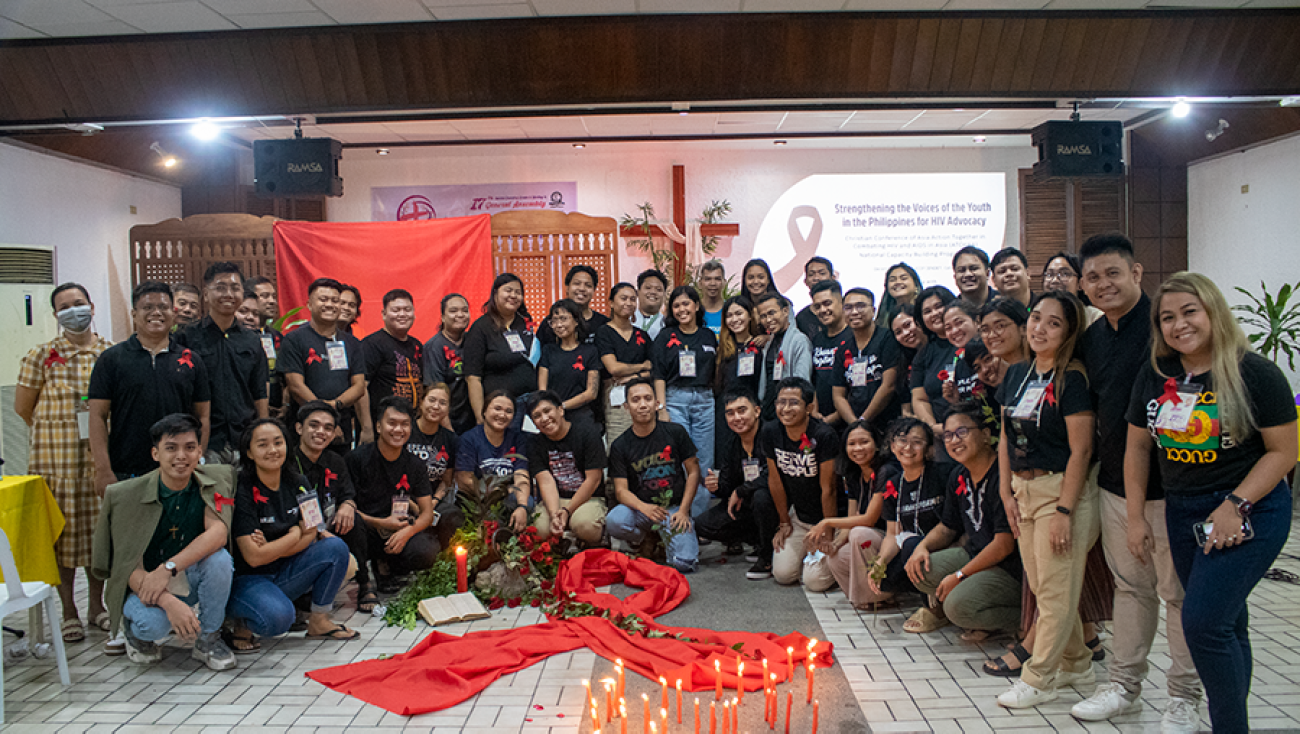On World AIDS Day, CCA strengthens advocacy capacities of ecumenical youth from the Philippines

Participants of ‘Strengthening the Voices of the Youth in the Philippines for HIV Advocacy’–2022
Cebu, Philippines: On the occasion of World AIDS Day, the Christian Conference of Asia (CCA) in collaboration with the Philippine Ecumenical Youth Council (KKKP) and the National Council of Churches in the Philippines (NCCP), organised a national conference with representatives of the churches across the Philippines on ‘Strengthening the Voices of the Youth in the Philippines for HIV Advocacy’.
The programme was held at the United Church of Christ in the Philippines (UCCP)–CENDET in Cebu City, on 1 December 2022.
Around sixty key leaders from the ecumenical youth movement attended the conference, which aimed to revitalise churches’ collaborative efforts in dealing with the recent uptick of HIV and AIDS transmission in the Philippines.
Bishop Feliciana Tenchavez of the UCCP West Visayas Jurisdiction shared a biblical-theological reflection on the healing of the leper in Luke’s gospel as well as Jesus’ promise of abundant life.
“The reality of HIV and AIDS poses a big challenge to the redemptive and healing nature of the church as a faith community,” Bishop Tenchavez said, comparing the leper from the text to people living with HIV and AIDS.
“In dealing with people living with HIV and AIDS, even the church has succumbed to discrimination and stigma. We, the church people, always say that we are concerned with upholding the dignity of life because the gift of life is sacred to us; regardless of the (HIV) disease, their lives are sacred.”
“We are encouraged to accompany them. We are ambassadors and catalysts. Let us pave the way for them (PLHIV) to live abundantly,” Bishop Tenchavez encouraged the ecumenical youth leaders as well as the churches to serve as change agents, thus promoting and protecting life.
Nica Bongco of the NCCP presented the context and situation of HIV and AIDS in the Philippines, including data from the United Nations Programme on HIV and AIDS (UNAIDS), indicating that the number of new infections in the Philippines increased by 327 percent in 2021, while the world faced the COVID-19 pandemic.
In the same session, she explored the relationship between HIV, health, and human rights. “When one’s right to health is violated, it is impossible to live a life based on justice, peace, and truth. People living with HIV are severely deprived of their rights. So, as young Christians, we must join them in living a life based on justice, peace, and truth,” she continued.
Bongco led the participants in an interactive discussion on Stigma, Shame, Denial, Discrimination, Inaction, and Misaction (SSDDIM).
During a workshop session on ‘HIV, Health and Human Rights: The Christian Youth Initiative’, the ecumenical youth leaders narrated concrete plans for the continuation of HIV and AIDS advocacy in churches and communities around the Philippines, which includes a proposed three-year programme on HIV and AIDS advocacy to be adopted by the Philippine Ecumenical Youth Council.
Dialogue with church and ecumenical youth leaders and advocacy networks, increased awareness and education, immersion at shelters, testing and treatment centres, interactions with people living with HIV and AIDS, peer training, provision of direct services, and community-based ministry would all be part of the proposed programme. Coordination and collaboration with local churches, church youth organisations, and community stakeholders would be the bedrock of the plan to increase the effectiveness of campaigns and advocacies.
Key ecumenical youth leaders from the Philippines pinned red ribbons on each other during a special World AIDS Day commemorative liturgy that was held as the culmination of the sessions, symbolising their ongoing dedication to HIV and AIDS advocacy in churches and communities.
The CCA has been actively mobilising its member churches and councils to respond to the alarming trend of new HIV infections in Asia under the Action Together in Combating HIV and AIDS in Asia (ATCHAA) programme.











